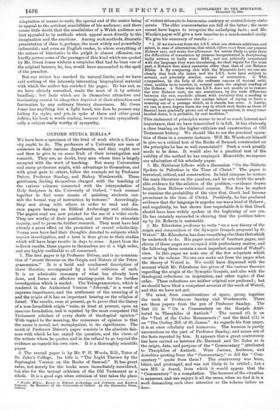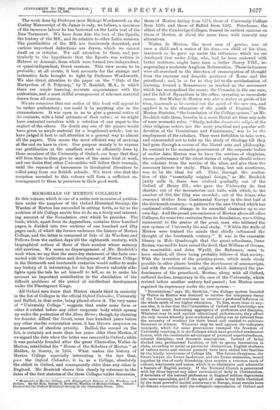OXFORD STUDIA BIBLIA.* WE have here a specimen of the
kind of work which a Univer- sity ought to do. The professors of a University are men of eminence in their various departments, and they ought now and then to give to us some fruit of their investigation and research. They are, no doubt, busy men whose time is largely occupied with the work of teaching. But many Universities and many professors might, with advantage to themselves, and with great gain to others, follow the example set by Professor Driver, Professor Sanday, and Bishop Wordsworth. These gentlemen, finding themselves charged with the teaching of the various sciences connected with the interpretation of Holy Scripture in the University of Oxford, " took counsel together to find some means of assisting students out- side the formal way of instruction by lectures." Accordingly, they met along with others in order to read and dis- cuss papers bearing on Biblical Archaeology and criticism. The papers read are now printed for the use of a wider circle. They are worthy of their position, and are fitted to stimulate inquiry, and to promote further research. They must have had already a great effect on the promotion of sacred scholarship. Young men have had their thoughts directed to subjects which require investigation, and a bent is thus given to their studies which will have large results in days to come. Apart from the indirect results, these papers in themselves are of a high order, and are highly creditable to all concerned.
1. The first paper is by Professor Driver, and is an examina- tion of "recent theories on the Origin and Nature of the Tetra- grammaton." It is a lucid and condensed description of these theories, accompanied by a brief criticism of each. It is an admirable summary of what has already been done, and forms an effective starting-point for the further investigation which is needed. The Tetragrammaton, which is rendered in the Authorised Version " Jehovah," is a word of supreme importance, and the settlement of the meaning of it and the origin of it has an important bearing on the religion of Israel. The results, even at present, go to prove that the theory of a non-Israelitish origin " rests, at least at present, upon an insecure foundation, and is rejected by the most competent Old Testament scholars of every shade of theological opinion." With regard to the meaning, the consensus of opinion is that the name is moral, not metaphysical, in its significance. The merit of Professor Driver's paper consists in the absolute fair- ness with which he has stated the question, and the views of the writers whom he quotes, and in the refusal to go beyond the evidence as regards his own view. It is a thoroughly scientific paper.
2. The second paper is by Mr. F. H. Woods, B.D., Tutor of St. John's College. Its title is "The Light Thrown by the Septuagint Version on the Books of Samuel." It has great value, not merely for the books more immediately considered, but also for the textual criticism of the Old Testament as a whole. It is a good sign when criticism of text takes the place
• Studio Biblia Essays in Biblical Archcmilogy and Criticism and Kindred Subjects. By Members of the 1Juiversity of Oxford. At the Clarendon Press, Oxford. of violent attempts to harmonise contrary or contradictory state- ments. The older commentaries are full of the latter ; the more recent have begun to recognise the underlying facts ; and Mr. Woods's paper will give a new impulse to a much-needed study. We give his summary of results :— " 1. If we leave out from the LYa. what are obvious additions, and select, in ease of alternatives, that which differs most from our present Hebrew text, and make due allowance for errors likely to arise from the difficulties of translation by persons, inexperienced in deciphering badly written or badly worn MSS., and not critically acquainted with the language they were translating, we shall regain for the most part, a Hebrew text many centuries older than that of our Hebrew Bibles. 2. By comparing this with the Masoretio text, we can see clearly that both the latter and the LEX. have been subject to several, and precisely similar, causes of corruption. 3. This comparison, by the help of the ordinary canons of textual criti- cism, enables us to recover, in several cases, the original reading of the Hebrew. 4. Even when the LXX. does not enable us to restore the true Hebrew text, we can sometimes, by the wide difference between the two, conclude almost with certainty that a reading is corrupt, and save ourselves the useless labour of trying to force a meaning out of a passage which, as it stands, has none. 5. Lastly, we can in some degree learn the way in which such books as those of Samuel have gradually grown out of earlier narratives, in many cases handed down, it is probable, by oral tradition."
This statement of principles seems to us of so much interest and importance, that we have transcribed it in full. It has obviously
a close bearing on the higher criticism and construction of Old Testament history. We should like to see the practical opera- tion of them in a concrete instance. Will Mr. Woods set himself to give us a critical text of the Books of Samuel, constructed on the principles he has so well enunciated ? Such a work greatly needs to be done. It would also be a practical test of the validity of the method he has employed. Meanwhile, we express our admiration of his scholarly paper.
3. Mr. Neubauer follows with a discussion "On the Dialects Spoken in Palestine in the Time of Christ." The paper is historical, critical, and constructive. In brief compass he notices the main literature on the question, and he sets forth the avail- able evidence for the solution of the problem,—evidence drawn largely from Hebrew rabbinical sources. Nor does he neglect to examine the probability of the view that Greek had become prominent in the time of Christ. Positively, he has produced evidence that the language in popular use was a kind of Hebrew; and negatively, he has shown how improbable it is that Greek should have been widely spoken at the beginning of our era. He has certainly succeeded in showing that the position taken up by Dr. Roberts is untenable.
4. Mr. Edersheim professes to write "on a new theory of the origin and composition of the Synoptic Gospels proposed by.G. Wetzel." Mr. Edersheim has done something else than that which he undertook to do. His paper consists of fourteen pages, and eleven of these pages are occupied with preliminary matter, and the following three contain a most imperfect account of Wetzel's view. In this paper we note one of the few misprints which ()czar in the volume. No one can make out from the pages what the theory of Wetzel is. We could have dispensed with the account which Mr. Edersheim has given of the various theories regarding the origin of the Synoptic Gospels, and also with the theological reflections on inspiration, and other topics of that order. These reflections are neither original nor profound ; but we should have liked a competent account of the work of Wetzel, and this we have not got.
We must, from considerations of space, group together the work of Professors Sanday and Wordsworth. There are three papers from the pen of Professor Sanday. The first (5) is " On a Commentary on the Gospels Attri- buted to Theophilus of Antioch." The second (6) is on the "Text of the Codex Rossanensis ;" and the third (11) is on "The Corbey MS. of St. James." As regards his first paper, it is at once scholarly and humorous. The humour is partly unconscious on the part of Professor Sanday, and arises out of the facts reported by him. It appears that a great controversy has been carried on between Dr. Harnack and Dr. Zahn as to the origin, date, and purpose of the " Commentary " attributed to Theophilus of Antioch. Were Jerome, Ambrose, and Arnobius quoting from the " Commentary," or did the " Com- mentary " quote from them ? The controversy was keen, bitter, and prolonged, and was not likely to be settled ; but a new MS. is found, from which it would appear that the " Commentary " is a compilation. The humour of the situation is apparent, and one enjoys it all the more, when we find it in a work demanding such close attention as the volume before us does. The work done by Professor (now Bishop) Wordsworth on the Corbey Manuscript of St. James is only, we believe, a specimen of the immense labour he has bestowed on the Latin text of the New Testament. We have from him the text of the Epistle, the history of the MS., and its relation to other Latin versions. The peculiarities of the MS. are luminously described, and various important deductions are drawn, which we cannot dwell on or criticise. We call attention to them, and par- ticularly to the hypothesis that the Epistle was written in Hebrew or Aramaic, from which were formed two independent, or quasi-independent, Greek versions. This view seems to be probable ; at all events, it best accounts for the strange and instructive facts brought to light by Professor Wordsworth. We also direct attention to the paper on the " Date of the Martyrdom of S. Polycarp," by T. Randall, M.A., in which there are ample learning, accurate acquaintance with the authorities, and a moat skilful arrangement of relevant material drawn from all sources.
We are conscious that our notice of this book will appear to be rather perfunctory ; nor could it be anything else in the circumstances. It was open to us to give a general notice of its contents, with a brief estimate of their value ; or we might have contented ourselves with a selection of one paper to the neglect of the others. No doubt any one of the papers would have given us ample material for a lengthened article ; but we have judged it best to call attention in a general way to almost all the papers. This seems the most efficient way of arriving at the end we have in view. Our purpose mainly is to express our gratification at the excellent work so efficiently done by these members of the University of Oxford, our hope that they will from time to time give us more of the same kind of work, and our desire that other Universities will follow their example, until the reproach of barrenness in theological literature be rolled away from our British schools. We trust also that the reception accorded to this volume will form a sufficient en. couragement to them to persevere in their good work.



















































 Previous page
Previous page